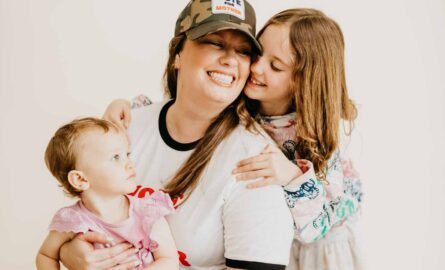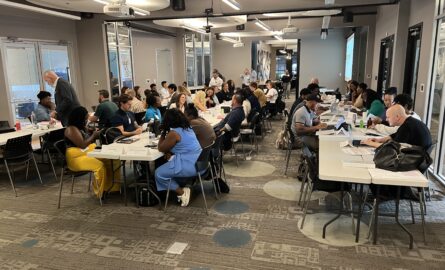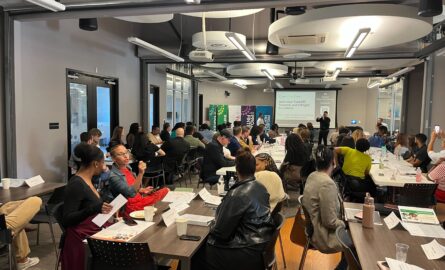Alexa Tercero started making jewelry during lunch hour at her Florida high school. Two years later, her business Faer for Everyone had generated $18,000 in revenue and landed her at the national INCubatorEDU pitch competition.
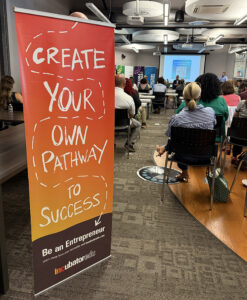
“It wasn’t just a program,” she says. “It was a spark that helped me grow, lead, and find my voice.”
This is what happens when you stop teaching entrepreneurship and start doing it.
Metro Nashville Public Schools Academies are expanding INCubatorEDU across the district—a year-long class where students don’t read about business. They start one. Real customers buy their products. Real revenue hits their accounts. Real failure teaches them what textbooks can’t.
For the program expansion to work, MNPS needs adults who will show up for students and be there through the ups and downs. The volunteer form takes one minute—just 7 questions to match you with the right role and school. Sign up here.
The Stakes Are Higher Than You Think
By 2027, most workers will freelance. The economy these students will enter rewards exactly what this program teaches: comfort with uncertainty, recovery from failure, and the ability to create value from nothing.
Wesley Burdette mentors teens in the program in Williamson County (he’s also a dad of twins at Brentwood High School). He watches something schools rarely deliver: transformation through genuine challenge.
“Getting these kids outside of the norm, the day to day and the schoolwork and being able to let them just kind of flourish—it’s really impressive,” he says. “Never really seen anything like that, especially at this early age.”
What Actually Happens in the Classroom
Students spend the school year getting their ideas (and there might be multiple attempts) ready to pitch before the volunteer board a.k.a. School Shark Tank. They identify problems worth solving. Interview potential customers who might buy nothing. Build products that might fail. Pitch to adults who might say no.
The curriculum covers financial modeling, legal structures, marketing strategy. But the education happens in the moments between instruction—when teams realize their first idea won’t work and must decide what to do next.
Some pivot. Some discover they can solve problems adults haven’t figured out. All learn that both failure and success contain opportunity.
Three Volunteer Roles That Need Filling
Coach: Teach what you know. Pick from sixteen subject areas—financial modeling, marketing, legal basics. You’ll spend 2-3 days team-teaching with classroom teachers. Materials and training provided. Students need your expertise, not your time.
Mentor: Guide a team through the year-long journey. Weekly or monthly conversations, sometimes by phone. You ask questions. They find answers. As Christy Scott from Uncharted Learning explains: “You don’t have to have the answers. You don’t even have to have anything to do with the business that student group has maybe starting, but you’re there to listen. You’re there to ask them those guiding questions.”
Board Member: Play friendly shark twice a year. Mid-term and final pitch events. Students present. You evaluate. Real funding decisions get made. This is where students learn the difference between a good idea and a fundable business.
Ready to help? The volunteer form takes one minute—just 7 questions to match you with the right role and school. Sign up here.
The Part Nobody Expects
“A lot of times these guys get stuck,” he says. “And so that’s the biggest thing. As long as you know there’s someone else in that corner with them, then good things start happening. I think the power of not being alone and having someone hold your hand is critical.”
Watch teenagers attack problems with fresh eyes and boundless energy. It changes how you think about your own stuck places.
The program has reached 178,000+ students nationwide. The model works because it mirrors what actually happens when you start something: lots of uncertainty, some failures, occasional breakthroughs, and the slow accumulation of confidence.
Tercero’s jewelry business began in a classroom at Lorenzo Walker Technical High School. Revenue came from “simple lunch hours within high school, local events, or just overall competitions.” The $18,000 she earned funded her college education and led to her current pursuit of a marketing degree at Florida Gulf Coast University.
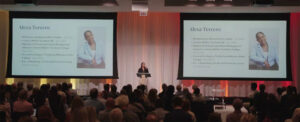
“The true beginning of my business journey all started off in 2022,” she explains. Even though she didn’t win the national competition, “the win for me was discovering more about myself.”
Your Move
Dan Phillips from Metro Nashville Public Schools keeps the ask simple: “Our ask of you is for your time and your network.”
No business degree required. No startup experience necessary. You need curiosity about what teenagers might accomplish with proper guidance and patience with the messy process of turning ideas into reality.
Volunteer sign-up link below. Three volunteer roles. Flexible time commitments. One shared goal: prepare Nashville teenagers for an economy that rewards the willingness to start.
Like Alexa Tercero, they might discover that the real win isn’t the revenue or the competition placement. It’s finding their voice and learning they can create value from an idea that started in a simple classroom.
That transformation happens one mentor, one coach, one board member at a time.
Ready to help? The volunteer form takes one minute—just 7 questions to match you with the right role and school. Sign up here.
Want to stay in the loop? Sign up for our EC 4-1-1 newsletter or check out the event calendar at ec.co/events.

